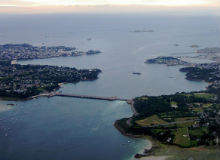

Sixteen kilometres off the Paimpol-Bréhat North Brittany coast, at a depth of 35m, lies a significant step for France’s tidal power industry. In January, Dublin-based OpenHydro successfully deployed the first of two tidal turbines offshore of EDF’s Paimpol-Bréhat North Brittany site.
The second turbine is scheduled to be deployed in the coming months, with both expected to be connected to the grid by this summer.
If this milestone is achieved, the project will be among the world’s first grid-connected tidal turbine arrays – an important leap for an industry that has been struggling against high costs and a lack of demonstration projects supplying reliable energy.
The project will also provide the companies with preparation and experience ahead of the Normandie Hydro project, which will see seven tidal turbines in the Raz Blanchard by 2018.
In addition, it is possible that these schemes could help France – Europe’s second-largest tidal resource after the UK – to become the continent’s market leader in tidal technology deployment.

US Tariffs are shifting - will you react or anticipate?
Don’t let policy changes catch you off guard. Stay proactive with real-time data and expert analysis.
By GlobalDataMaking gains
Tidal is a form of hydropower that converts the energy obtained from tidal currents into electricity.
This form of energy is thought to be hugely advantageous as it is carbon-free and renewable and, unlike intermittent solar and wind resources, tides are as predictable as time. The turbines used to harness this power are also hidden out of sight beneath the sea and, in most cases, cause little damage to the marine environment.
France was an early tidal energy pioneer with the commissioning of the La Rance tidal power plant near St Malo in 1966.
However, creating new commercially viable projects represents an ongoing challenge for the global tidal power industry.
The UK, which represents about 50% of Europe’s tidal energy capacity, has received millions of pounds of investment for its tidal sector but is yet to produce any significant electricity for the national grid, or a commercially viable project.
The French connection
Leading UK tidal power companies Atlantis Resources Limited and Tidal Lagoon Swansea Bay have yet to make significant gains on promising early starts.
The Swansea Bay tidal project recently announced it has secured £100m in investment; however, this merely means an investor is prepared to pay if the company secures the appropriate contractual structure with the UK Government, which it currently doesn’t have.
Atlantis Resources, which is around 80% state-financed, doesn’t yet have an operating turbine in the water that is producing reliable energy. Further investment is unlikely until this milestone is achieved.
OpenHydro’s CEO of development James Ives has said the OpenHydro/EDF Paimpol-Bréhat project is "An essential step in progressing towards commercial-scale arrays".
Could Paimpol-Bréhat be a defining moment for tidal power and France’s leading role in the industry?
"I am a little bit cautious about getting the champagne out yet," says David Casale, director at Turquoise, a merchant bank that specialises in financial advisory and venture capital investment in energy and environment, including tidal power. "However, I think the French way of doing things can be highly effective."
For the project, GE Power Conversion (GEPC) is developing a submerged converter that will transport power produced by the turbines to an onshore substation, also developed by GEPC, on Arcouest Peninsula in Ploubazlanec, so the power can be connected to the grid.
According to OpenHydro, deploying the first of the turbines to the seabed took a mere half an hour using a dedicated barge designed by the companies.
Once the barge was stabilised, the turbine was lowered to the seabed using an innovative winch system equipped with hydraulic motors. The Open-Centre Turbines used for the project are designed to be deployed directly on to the seabed.
An industry leader in the making
Could France overtake the UK as industry leader? "Yes," says Casale. "If the French state decided this is a technology they want and they want to do a very good demonstration then they could well overtake the UK in that regard."
There is certainly no doubt the tidal industry is in dire need of a successful tidal pilot project that provides a turning point for the rest, especially one that can produce power at a cost in-line with offshore wind. If this can be achieved there will be little holding the industry back, as tidal power is more favourable and holds the same price point as wind.
No one knows at this stage if the Paimpol-Bréhat or Normandie Hydro projects will be the first to gain success but all eyes will be on the projects over the coming months and years.
Although Cansale concedes it would be a ‘shame’ if France took the lead on tidal power as he says "the UK set out much earlier and has spent a lot more money", what’s in fact more important is reaching those important milestones as an industry, regardless of who does it first.
"Can we get there and has anyone got any ideas how we can do it?" asks Cansale. "If the French have got an idea they would be doing the UK a huge favour by showing us – we can then all pile into that space as investors and project companies and deploy the resource."



